A Permaculture teacher of mine once said, A good way to gauge the knowledge of a Permaculturist, is by looking at their bookshelf. While I would extend it a bit by pointing out that they should have actually read those books, understood them, and turned the information therein into something practical, I agree that a good set of references is essential to any practice, Permaculture included.

So here I would like to share the books from MY bookshelf I consider most important and valuable in learning about Permaculture. Needless to say, they only include the books I have read. There are countless other resources out there worth checking out.
Permacultue Basics
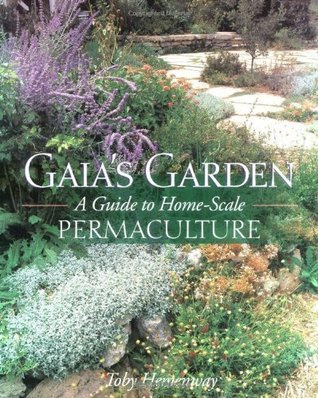
It's incredible how many introductory books have been written on Permaculture. Most of them become fairly repetitive once you've been exposed to the basic ideas, so it's best to start with a book that captures your attention, gives wings to your imagination, and excites you to the point of reading straight through the night. I understand we all have different preferences, but the book that met all of these criteria for me was Gaia's Garden by Toby Hemenway. What I loved about it were all the practical applications of Permaculture principles and ideas to implement in your own garden. The focus of the book is a suburban garden to a small-scale homestead, so many of us can jump right in and experiment with it. On the downside, the book focuses almost exclusively on the temperate zone climates, which can take the wind out of your sail if you happen to be living in another region.
Other introductory Permaculture books include The Permacultue Way by Graham Bell, not bad but less exciting than Gaia's Garden, and Bill Mollison's Introduction to Permaculture, which is composed of a series of pamphlets and other printed material, and is the perfect way to get the reader prepared for his BIG BOOK: Permaculture A Designers' Manual.
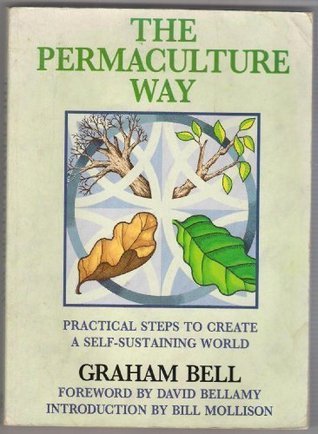
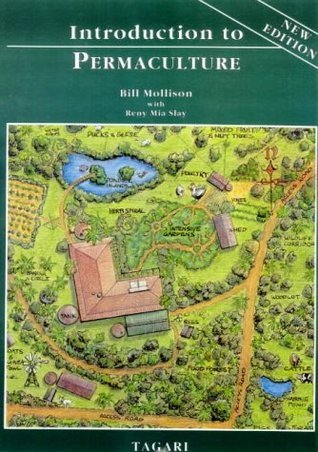
Deep End Immersion into Permaculture
There is probably no other book I've come across with as much detailed information on Permacultue than Bill Mollison's Designer Manual. It includes everything: Starting out with a thorough discussion of the values and the mindset behind the principles of Permaculture, it goes on to look at such aspects as water, soil, plants and animals, in various climatic regions, from riparian zones to deserts, tropical rain forests to cold regions, including also urban environments. In its last part the book even discusses 'invisible structures' having to do with community organizing, trusts, finance, local currencies, and other social constructs. It is a huge book but it can be immensely helpful to consult as questions crop up.
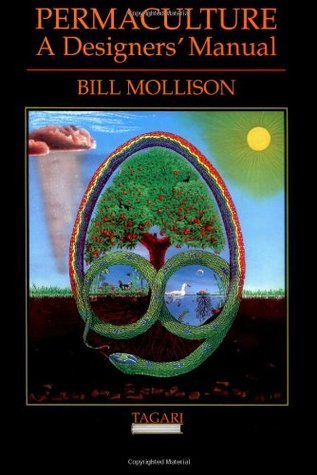

Another such great resource is David Holmgren's Permaculture Principles. Although it seems to be more theoretical at first glace, it gives ample examples to illustrate each principle in great detail. Some of these can be easily tried and implemented in a typical household, others are more conceptual and large-scale in nature. Still, I consider this book another invaluable resource in turning Permaculture theory into practice.
Food Forests
Once we've gotten a thorough overall impression of Permaculture, we may want to apply it to our own areas of interest. A frequently mentioned one is designing a food forest. The book I found immensely interesting in this regard is Tree Crops A Permanent Agriculture by J. Russel Smith. Even though it was written a century ago, long before the modern term Permaculture was coined, it reads just like a practical Permaculture guide, advocating perennial plants (trees) for food production, either directly, or indirectly by providing forage for animals. Another great book on this topic is Sepp Holzer's Permaculture, who went against all odds and designed an incredibly integrated farm on his alpine property. Another great thing about this book is the author's radically individualistic attitude, making it not only informative but highly entertaining. Finally, the most comprehensive book on food forests I've read is Edible Forest Gardens Vol. I and II by David Jacke and Eric Toensmeier. This one goes into great depths in detailing how to plan and execute your forest design, considering everything, from water, sunlight, and interaction between species, all the way to space and time, taking into account how big the trees will grow. I'll have to re-read these books when I start designing my own food forest.
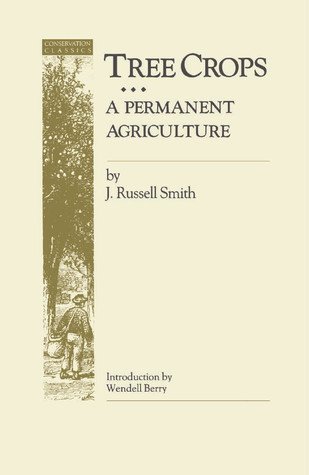

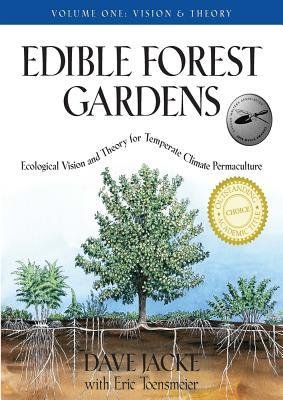
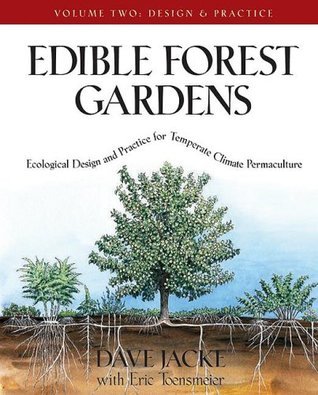
Permaculture, or Just Close Enough?
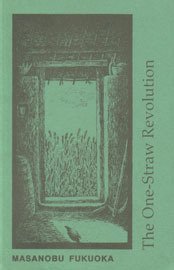
Sometimes a book can be an amazing Permaculture reference, even though the author never intended it to be, or may not even have heard the term. Still, I think they fit right in, as Permaculture itself is highly inclusive. One famous such book is The One-Straw Revolution by Masanobu Fukuoka.
Though initially the author seems to want to focus on merely avoiding unnecessary chemicals, in his explication of the practical application sheds light on many great techniques, such as using cover-crops, and emphasizing companion planting. Another book which could have been just about Permaculture, though it was written in the 19th century, is Ten Acres Are Enough by Edmund Morris. Just as the title says, the author points out the advantages of a small, intensive, but highly diverse homestead. Finally, another book that talks about Permaculture without mentioning it is Teaming with Microbes by Jeff Lowenfels and Wayne Lewis. I particularly like this one because it raises the importance of the soil food web, that is maintaining, and even augmenting the fertility of your land by paying attention to the microbes living in it.
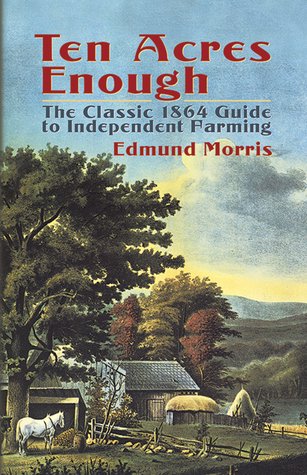
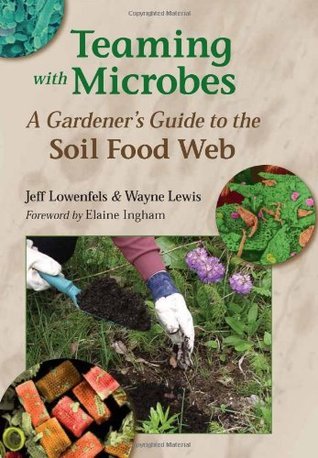
Of course these twelve volumes merely cover the basics. For each specialized area there are other great Permaculture books. Though these works should give you a solid foundation. Enjoy reading!
Sources: 1, 2, 3, 4, 5, 6, 7, 8, 9, 10, 11, 12 Pics: 1, 2, 3, 4, 5, 6, 7, 8, 9, 10, 11, 12, 13
Join LBRY To Get Your Own Copies!
If you are interested in reading these books, you can find them on my sustainability channel at LBRY. If you are interested in joining LBRY, please follow my invite. You may also be interested in my other book reviews in my Bibliophilia series:
My 12 Most Recommendable Permaculture Readings
Another 12 Permaculture Books - Specialized Readings
Riane Eisler – The Chalice and the Blade
William McDonough and Michael Braungart - Cradle to Cradle
Charles Eisenstein - Sacred Economics
Ken Kesey - One Flew Over the Cuckoo's Nest
Charles C. Mann - 1491
Tom Wolfe - From Bauhaus to Our House
Ideas and Concepts of Daniel Quinn
B. Traven - The Death Ship and The Cotton Pickers
Books by Wladimir Kaminer
Remembering the Good Doctor Gonzo - Hunter S. Thompson
Tom Wolfe - The Electric Kool-Aid Acid Test
Robert A. Wilson Expanding His Readers' Minds
Gary Jennings' Head-dive into Mexican History
Excellent Resources! I would say the top 5-6 should be more-or-less the same for most established Permies... There is also lots of great new stuff (Ben Falk, Richard Perkins, Jean Martin Fortier though not all formally 'Permaculture', JMF) I would also wish to include Mycelium Running By Paul Stamets and Radical Mycology by Peter McCoy since fungi is like an entire continent of potential only just getting discovered in the modern world and embraced by the Permaculture Community. Barefoot Architect and the Earthship Trilogy could be great for Zones 0 to 3 as well as A Pattern Language for community/city planning. I could go all night.... WOULD LOVE TO HAVE A BOOK CLUB! If anyone wanted to hear info from any of my library I can check the relevant chapters and either read out the appropriate section, write a post or take a picture of the best section. Literate Anarchist Unite! Dislexikz Untie!
Resteeming with Gusto!
Book club!!!
I have pdfs of most of these books that could facilitate a book club!
Im not always sure how freedom of information and intellectual property fit into permaculture, so feel free to berate me and I might do a post about it.
on having a Club: Yeay, I always enjoy sharing a connection with others.
on collecting and sharing books: 100% behind it. I've been trying to acquire all the books I remember having read on .pdf It's coming along nicely, though far from being complete. But at least the ones I mentioned in this post I do have, and don't mind sharing if there is interest. I also have a bunch I have NOT read, such as A Pattern Language which I've been trying to get around to for quite a while now.
on having a book club / reading circle: It sounds awesome to read something, chapter by chapter, and discuss it with other minds. I'm a bit uncertain if I can go through with it, on the other hand, it would be so rewarding that I'd probably make the time. It also depends on the book. :-)
Ditto, maybe we see each other for coffee and compare notes ;) Someday, would be great! In the meantime, we should probably behave ourselves publicly.
Right, you've felt it, @ecoknowme. This post is either too broad or not inclusive enough. I realized that when I got to the part about the food forestry books. And indeed, there is another post in the making, about some more specialized ones on fungi, fermentation, earth-works, construction, and invisible structures. In fact, all my previous book reviews could also fit in quite comfortably.
we should just do a skype call and record us talking about our favorite books! Some day, by wire or walk, we'll share a coffee, mate, mead or yarn someday, my friend.
sounds like a great way to spend time "together".
I just dunno how to do the recordy stuff, but we could even just take pictures and summize a brainstorm.. show an example of interconnection and collaboration thanks to Steemit. I probably never would have encountered you otherwise!
Oh, we could do a book-club so simply: decide what to read, give each member a chapter and a deadline, and each one of us writes a post about it. Then all other add their comments. Sure, it's not as fancy as recording a video-conference, but it can be done with minimal effort and flexible times.
First I would like to be able to make the books available though. There are files online or videos to review But, for example, My copy of Radical Mycology is this massive beast not everyone would be into, or could get easily in some parts of the world. Maybe we just encourage everyone to do reviews of What books they have and hope for some cross pollination of ideas? The video conference idea does sound like a nightmare... too many variables, I'm probably better off blithering into a 'podcast' then everyone can retort. Will do some research...
Love hearing about new books! Thanks for the suggestions. Gaia's Garden is the one that opened up the rabbit hole for me.
Yes, that is such a well written one. And the Designers Manual is great for looking things up. From then on it depends on the area of your interest. Most specialized books such as Jenkins' Humanure Handbook I didn't even include here for its specialized nature.
I was just talking about the Humanure Handbook with @ecoknowme. Another great one!
Hey don't talk shit about me :P
opp, probably should have used this account for that. I have two alter egos on here... I take my personal profile for a walk to get exercise.... but it's still moi. ;)
Haha! that's awesome! I had no clue. Why did you decide to have 2 seperate accounts like that? Do you see a benefit? Or is one a business?
the personal one will be for me waxing poetically or randomly... the ecoknowme will be for the project to replace the Economy with Love, I mean Permaculture... I mean Personal accountability for the future empowered by Ecologically based Solutions and The Best Knowledge the Internet and I have to Offer, all while paying people to do so, here on Steemit. That is why I repost like crazy on Ecoknowme but will keep my feed crisp for meself. Also allows for double votes, less obvious self votes, resteems, double resteems, good cop better cop and silly online tricks for newbies, if applicable. The ecoknowme can host competitions, projects, promote the works of others and all the revenue will get REdistributed to the people who dig it 80/20 I only get 20% but I can choose to pay that to my personal account, donate it, or just put it towards the SP of @ecoknowme I wanted the 'me' part to come last... so I might introduce myself with the personal account soon enough... for now, let them eat cake in a hammock!
I had a post about getting a planteconomy for medicinal tonic herbs from around the world (He shou Wu, Gotu kola, Rhodiola, whatever works where you are but not for someone else... I think of all the times I drive past sage brush, grab a handful and wonder why I didn't just get two? @farmstead is there sage near you?) Anyway... I think I am looking at about 4 bucks on that once 25% is deducted for curation... That would be about $3.20 SBD for the Ecoknowme participants (this time will be guided random) and 0.80 for myself.
Stuff like that. I can try to do a post for your global steem circle test, and add my 20% to that for a full 100% toward global interconnection. I think it could work :)
Ha! Now I even remember reading this comment, and still not getting that @ecoknowme and @wuji are the same people!
tricky with Permaculture and specialization. I'd almost have to say Bill and David's two books are the only generalized Manuals... after that it get pretty focused. Alternative Economics could be considered just as central as say, food forests... but if you live in Hong Kong, Permaculture is not inaccessible, just different... Window gardens and Patio Permaculture could be the main thing. Was wondering about underground permaculture.... like literally. What if you had to be sustainable in a bunker for a year/indefinately? Just a thought exercise... I really dunno where to draw the line so I tend to branch out with vigor and reckless enthusiasm. But the 'philosophy' is important. One way I heard it... "if it doesn't care for people, the Earth or return the surpluses back into the system... it's not Permaculture' an easy starting point I spose.
Saw this on SteemitBC's Slack channel. Thanks for the recommendations. I've barely got a toe into permaculture, but I've been fascinated by its principles for years.
Me too, hahaha, and you know what? It's not going away. I love how in a few simple guidelines it lets you come up with you own best way of doing things... which ends up well for everyone involved.
Its a design system! There are no right answers, just best practices for finding the right answers.
Another way to look at it is technique vs strategy. There are many techniques, such as swales, perrenial crops etc, but its up to you to combine those techniques in your own unique way to develop a personalized strategy.
Doodle, wander... explore. It's a long journey even after decades (I hear) but such a lovely one. Permaculture was the first thing I came across that gave a set of guidelines, principles and ethics to empower anyone to turn problems into solutions through a deeper insight into the Natural World. Anyone can do it, you just have to start walking. Follow your nose!
I actually have a copy of Gaia's Garden, but it was a workshop that I attended on permaculture principles that really started making sense to me. The instructor was talking about thinking of your home (your life) in zones, circles radiating out from the center. The things that need your attention the most should be close, and so on from there. Now, you'd think that we'd all already understand that. It seems like common sense, but the way that my instructor explained it made me see that I wasn't doing that quite so well, neither in my garden areas nor in my life. It blew me away.
Oh, I know... there are so many new things to discover in every-day situations. Looking at the flow of things is one interesting way of learning of relationships: flow of people, flow of energy (including money), or very concretely, flow of hot / cold air, flow of water, where animals move, etc. Or repetitions, that is things occurring on a regular basis. Why? How? Alternatives? Are there any unclosed loops? Sure, all this sounds confusing in theory. Once you put them into practice, it's like: how come I've never noticed?
I've been collecting books on permaculture for years. Reading them is a different story. One day I'll find the time :) Thank you for these suggestions, I'll keep an eye out for them.
That's usually how it works. But good to have the books around. For me actually it was the other way round: I found myself frequently stuck on the metro, and had just gotten my first smartphone: that's when I went through a bunch of them in electronic format.
Thank you so much for this!! I actually have sepp's book and the gaia's book saved to eventually read but didn't know about the others :) Also happy to see you point out the food forest specific books!
Definitely two of my favorites. Both of them are such a pleasure to read, beside being informative.
Watch Videos of Sepp on Youtube... the book is wonderful and an excellent resource but we are fortunate to be able to see his operation in action online.... much to explore!
Yes I have seen pretty much every video on there of sepp's property!
Are there any topics in particular that are on the periphery of your studies now that you would like to expand on these days?